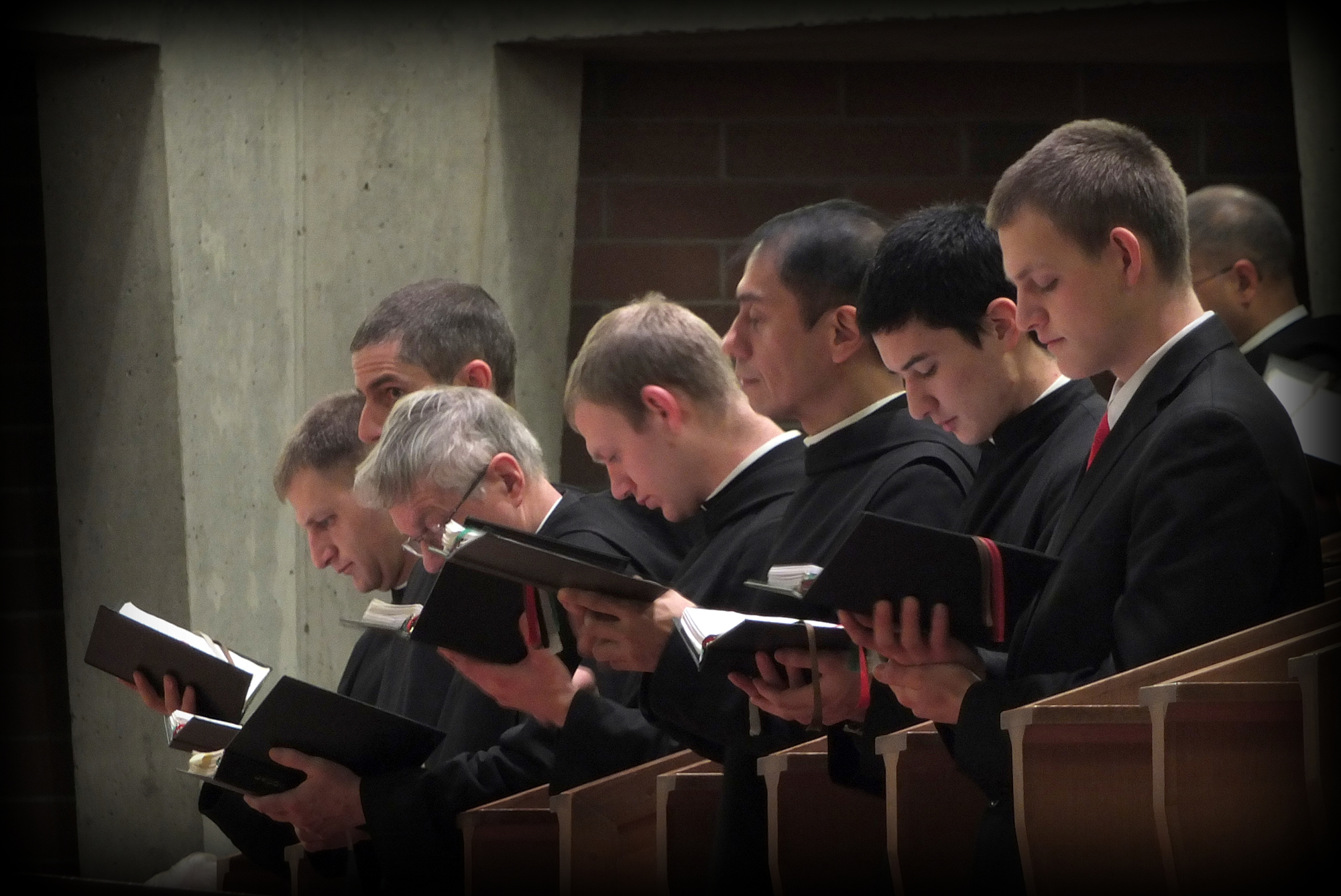Benedictine Monasticism
“But as we go forward in our life and in faith, we shall with hearts enlarged and unspeakable sweetness of love run in the way of God’s commandments; so that never departing from His guidance, but persevering in His teaching in the monastery until death, we may by patience share in the sufferings of Christ, that we may deserve to be partakers of His kingdom.”
– Rule of St. Benedict, Prologue
Who is the father
of Western Monasticism?
What is our vocation
and mission?
To what promises does
a monk commit his life?
How did our monastery
come to be?
What is the meaning
of our Coat of Arms?
Benedictine Monasticism
A Vital Contribution to the Church
A glance at the history of this abbey or of any of the European or American abbeys can make us aware of the complex yet vital contribution a Benedictine monastery makes to the Church. What are the specific contributions of a monastery to the mission of the Church? From the point of view of the spiritual goals of the monastery one can discern certain vital inter-relationships.
To seek God, to seek the Son of God, Jesus Christ, is to experience his redeeming love − to undertake that first conversion of the Gospel − our own hearts and bodies must experience freedom from sin and death in Christ − “Prefer nothing to Christ”. To maintain this priority of the ascetical discipline, is our hope here at Westminster Abbey. Such a discipline silently preserves humanity from the destructive forces of sin and death. Thus a monastery becomes a beacon of hope and moral renewal in society, a sign of fraternal love − of transformed human relationships.
work of God
To be fervent in the work of God, to worship the Father, is to learn the true art of worship and praise of God. At the core of all ancient civilizations was their religion or cult − the honour and sacrifice due to the deity. It was this cultic/worship aspect that inspired and drew forth the greatest inspirations and achievements of the human spirit. When man does not know how to worship God and live in intimacy with him he ceases to be human − because his highest dignity resides in living in union with God who is love. Christian worship trains the monk to give himself to God in a continuous act of praise and thanksgiving. The place of the Liturgy begins to emerge in its most vital role: it preserves the human family from wandering away from its destiny.
and humiliations
In obedience and humiliations: The perfection of all one’s spiritual energies is born not of independence but of dependence, and interdependence. Perfection of service comes in dependence on the Spirit of God, in obedience to the Abbot, in mutual obedience to each other. It is the Spirit of God who teaches us the necessary sifting and discerning of culture and Gospel, of the secular and the sacred, of what is from God and what is from man. Here the Benedictine life attempts to manifest its priority by the holiness of its monks, the primacy of grace and attention to the things of the Spirit. Nothing is lost in keeping holiness as a priority−nothing is gained when other things take priority.
to the Rule
of St. Benedict
A Christian community wholly committed to the worship of God, to a fraternal life in communion, to preserving the riches God has placed in our humanity for future generations, this is the fruit of our fidelity to the Rule of our Holy Father St. Benedict. The fruit of this fidelity naturally overflows into all her work. A long standing part of our contribution to the Church and the world lies in our work of education.
In the monastery a monk is surrounded by the balanced example of the human and supernatural life which is attractive in a world out of balance. Life lived frugally and simply is in direct contrast to the vanity of a consumer culture. The example of hard work is a countercultural sign to a society preoccupied with leisure and entertainment. The intellectual life is given its place. Our monks and students are taught that the path of holiness is far superior to the preoccupation of earning a degree; that while serious intellectual study is a must, seeking wisdom is better; that while individual personal development is important, the common good of the community is greater; that in a scientific world where efficiency and production and the use of electronic technology is dominant, the careful and thoughtful attention given to each person encountered is a far higher and enduring good; that in the face of the destruction of the environment, the bond with the land is cherished and nurtured.
The monastery thus becomes a true oasis of human and divine life, radiating the mystery of the universal Church: to be a sacramental sign of union with God and communion among men. Is not this the perfecting of our monastic service in the mission of the Church and the plan of God?


